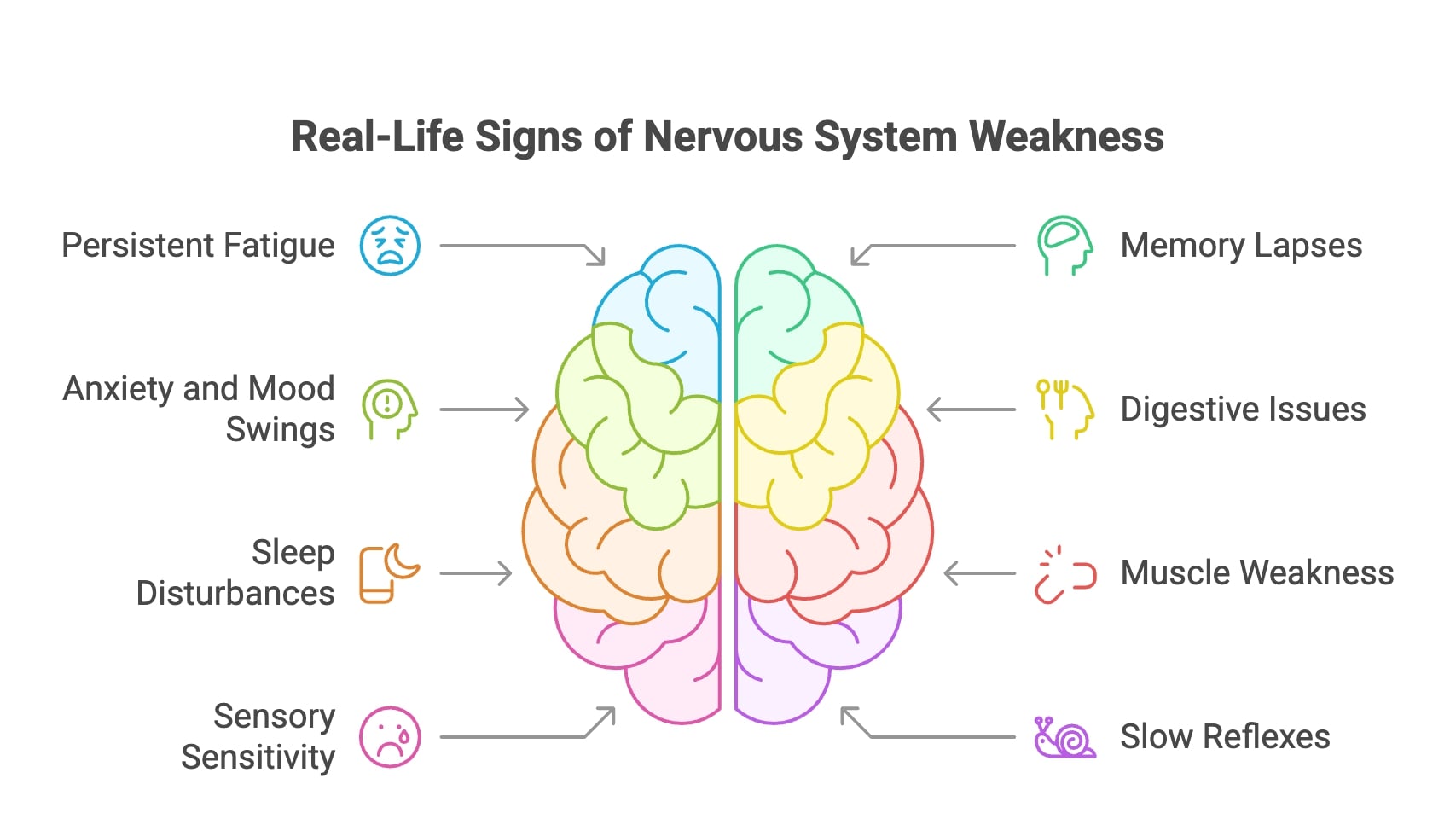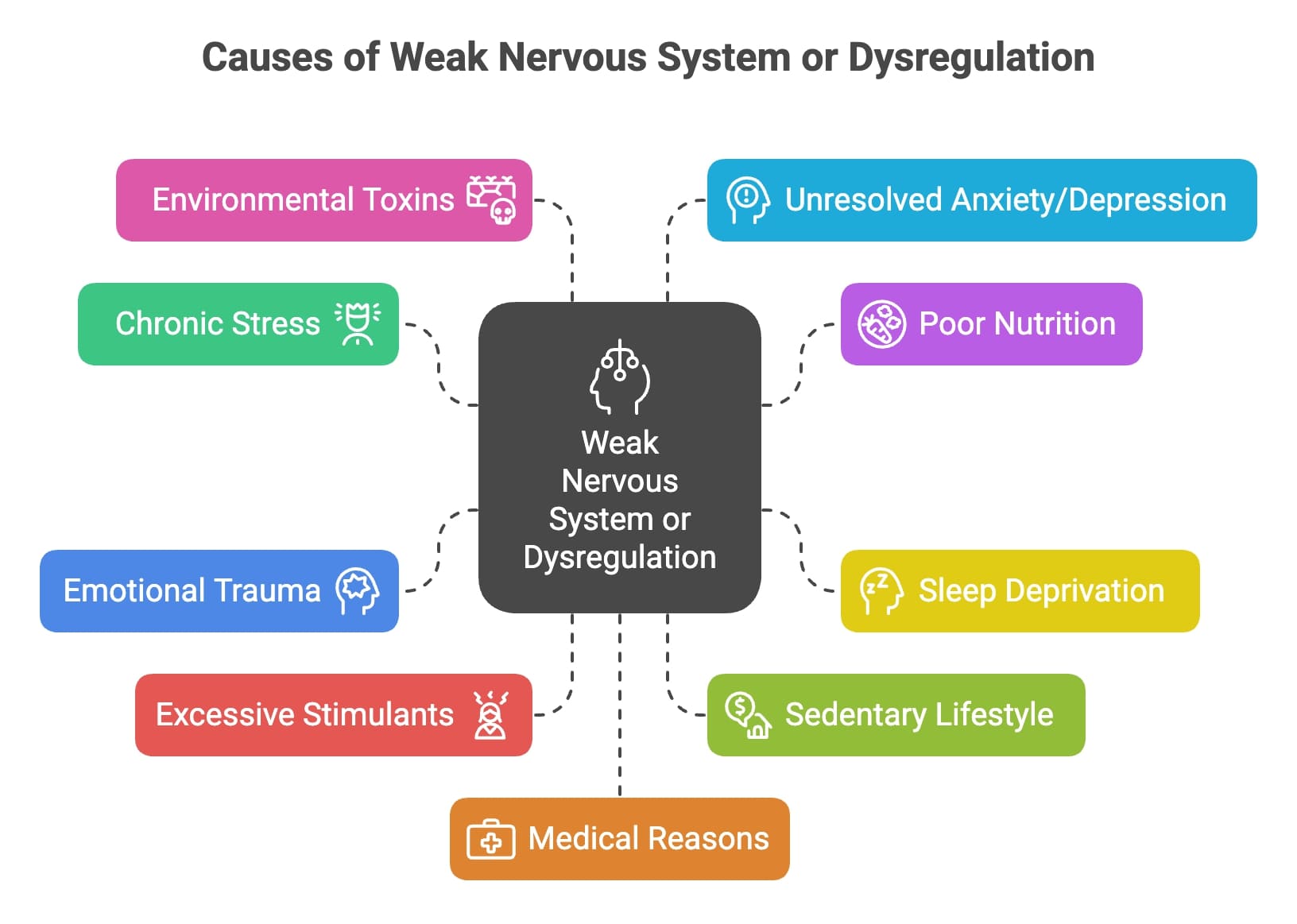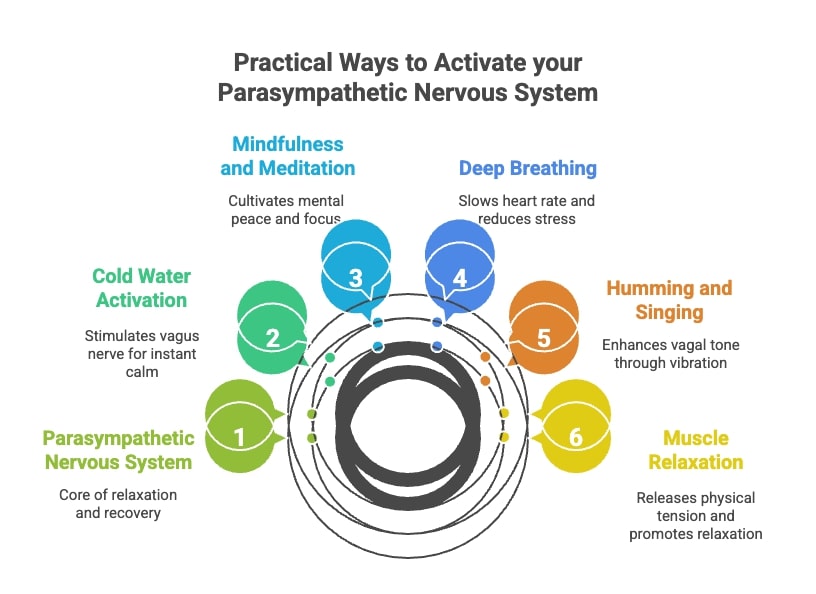
Amaha / / / Causes & Signs of a Weak Nervous System - How to Strengthen Your Body's Control Center
ARTICLE | 6 MINS READ
Causes & Signs of a Weak Nervous System - How to Strengthen Your Body's Control Center
Published on
24th Jul 2025

Dr Janani Vasanth
MD Psychiatry
.jpeg?alt=media&token=0a228bf9-6cdc-4fc1-8f43-7bffb25be375)
Our nervous system processes over 11 million bits of information every second, yet most of us barely think about it until something goes wrong. A recent study by the Indian Council of Medical Research revealed that nearly 35% of urban Indians show signs of nervous system dysfunction, primarily due to stress and lifestyle factors.
"The nervous system is like the electrical wiring of your house," explains Dr. Khushboo Kansal, a leading psychiatrist at Amaha, Delhi. "When it's weak, everything else starts malfunctioning."
Most people don't even realise their nervous system needs attention until they're dealing with chronic fatigue, anxiety, or those mysterious aches that doctors can't quite explain.
What Exactly Makes Your Nervous System Weak?
The signs aren't always obvious. Sometimes it starts small. Perhaps you're feeling unusually jittery during your morning meetings. These seemingly minor issues can actually signal deeper problems.
Common signs of weak nervous system include:
- Persistent fatigue that doesn't improve with rest
- Memory lapses, brain fog and difficulty concentrating
- Unexplained anxiety, mood swings, unexplained irritability
- Digestive issues without clear cause
- Sleep disturbances (too much or too little, both count)
- Muscle weakness or tremors
- Heightened sensitivity to light or sound
- Slow reflexes or coordination problems
People usually Google these symptoms separately. “Why is my hand tingling?” or “Why can’t I focus lately?” Few stop to connect the dots back to one root issue: nervous system health.
My cousin Priya, who works in IT, started experiencing these exact symptoms last year. She'd blame it on work stress, but the problems persisted even during her vacation in Goa. Turns out, her nervous system was crying out for help.

Find out how severe are your symptoms
Take the Amaha assessment to know if it is a temporary phase or there are deeper concerns.

Why Does It Happen? And to Indians, Especially?
Lifestyle. Stress. Food. Sleep. Pollution.
In India, chronic stress is almost a cultural inheritance. Work pressure, academic expectations, financial worries,and family responsibilities it all adds up. Add to that poor sleep hygiene, excessive gadget use, and highly processed diets, and your nervous system starts to crumble quietly under the weight.
You see, the nervous system thrives on balance. Too much ‘fight or flight’ (sympathetic) and not enough ‘rest and digest’ (parasympathetic), and the whole system starts to wear thin.
What Causes Nervous System Dysregulation?
Your nervous system controls how you rest, digest, or react to stress, and is incredibly sensitive to your lifestyle. The way you eat, sleep, manage stress, deal with emotions, even how much sunlight you get... all these factors into the health of your nervous system.
Common Reasons of Weak Nervous System or Dysregulation:
1. Chronic stress - Long-term stress (emotional, financial, relationship, work) keeps your sympathetic nervous system stuck in overdrive. That’s not sustainable. Eventually the whole system will crash.
2. Poor nutrition - Low intake of B12, Vitamin D, magnesium, and healthy fats (which are all super common in Indian vegetarian diets)
3. Sleep deprivation - Your nervous system resets during deep sleep. Hence, deep restorative REM sleep is essential.
4. Emotional trauma (past or present) - Emotional setbacks whether from childhood, a breakup, injuries, medical issues, bullying, or even subtle but chronic neglect can silently keep your nervous system dysregulated. It’s like the body stays in “defense mode,” even when the threat is long gone.
5. Too much caffeine or stimulants - Indians love chai, but 4 cups a day + energy drinks or coffee? That’s nervous system chaos.
6. Sedentary lifestyle - Movement, especially rhythmic movement like walking or dancing actually regulates your nervous system. No movement, no regulation.
7. Environmental toxins - Pollution, pesticide-laced foods, even heavy metals from cookware or water over time, can irritate the nerves and cause inflammation.
8. Unresolved anxiety or depression - Mental health and nervous system health go hand in hand. If you’re always anxious or numb, your nerves are bearing the load too.
9. Medical Reasons that can cause a weak Nervous system
- Diabetes (leading to neuropathy)
- Vitamin B12 deficiency
- Hypothyroidism
- Autoimmune disorders (like MS)
- Post-viral fatigue (seen a lot post-COVID)


Get 15% OFF on First 3 Sessions - Use Code: FIRST15
Therapy works best when it’s approached with consistency. Take those first few steps with confidence, so you can begin your mental health journey. **Limited Period Offer
The Sympathetic vs Parasympathetic Battle
Your nervous system has two main players: the sympathetic and parasympathetic systems.
The sympathetic nervous system is your body's alert system. It kicks in when you're stuck, facing a deadline or doing something crucial. Heart rate spikes, muscles tense up, digestion slows down. This fight or flight response served our ancestors well when they faced tigers, but nowadays it activates for much smaller threats.
Parasympathetic: Slows things down. Calm, digestion, healing. The parasympathetic system? That's your "rest and digest" mode. It's when your body repairs itself, processes food properly, and restores energy.
The problem is modern Indian lifestyle keeps us stuck in sympathetic overdrive.
Most working professionals in cities like Bangalore, Delhi or Mumbai spend 12+ hours in this heightened state. No wonder we're seeing such high rates of nervous system dysfunction.
How to Fix and Strengthen a Weak Nervous System
Start with the basics:
Sleep becomes non-negotiable. Deep, restorative rest is essential. Your nervous system repairs itself during deep sleep cycles. Try maintaining consistent sleep schedules.
Movement matters. We're not talking about grueling gym sessions that further stress your system. Gentle activities like yoga, walking in your local park, or even dancing can work wonders.
Focus on Deep Breathing techniques. The 4-7-8 technique works particularly well for dealing with high-stress environments. Breathe in for 4 counts, hold for 7, exhale for 8. Do this for just 5 minutes before bed, and you'll notice the difference within a week.
Nutrition for Your Nervous System
Essential vitamins for nervous system health:
B-complex vitamins (B1, B6, B12) - Many vegetarians are deficient without realizing it. This vitamin is crucial for nerve function and myelin sheath production. You'll find it in dairy products, but consider supplementation if you're vegan.
Vitamin D deficiency is shockingly common in India despite abundant sunshine. Most people spend too much time indoors. This vitamin plays a crucial role in nerve health and mood regulation.
Omega-3 fatty acids reduce inflammation in nerve tissues. While fish is an obvious source, vegetarians can get these from walnuts, flax seeds, and chia seeds.
Magnesium helps calm an overactive nervous system. It's often called "nature's relaxant" for good reason. Many Indians are deficient due to depleted soil minerals.
Foods That Heal Your Nerves
Turmeric contains curcumin, which crosses the blood-brain barrier and reduces neural inflammation. Add a pinch to your morning or evening milk.
Almonds have been used in Ayurveda for brain health for centuries. Soaking them overnight and eating them first thing in the morning provides sustained energy and supports nerve function.
Avoid these nervous system disruptors:
Processed foods high in trans fats wreak havoc on nerve membranes. That packet of instant noodles might be convenient, but it's not doing your nerves any favors.
Excessive sugar creates inflammation and destabilizes blood sugar levels, which directly affects nerve function. Notice how you feel after consuming too many sweets during festivals? That's your nervous system responding. Avoid stress eating.
Caffeine, while temporarily energizing, can overstimulate an already stressed nervous system. Consider switching to green tea or herbal alternatives.
Supplements and Medications
While whole foods should be your first line of defense, sometimes targeted supplementation helps. But please, consult a qualified doctor before starting any new supplements.
Commonly recommended supplements include:
Ashwagandha, an ancient herb used in traditional Indian medicine, helps balance stress hormones and supports overall nervous system health. Studies show it can reduce cortisol levels by up to 30%.
Some doctors prescribe specific medications for severe nervous system dysfunction. These might include nerve pain medications, anxiety reducers, or sleep aids. The key is working with a healthcare provider who understands your complete health picture.
How to Activate Your Parasympathetic Nervous System
1. Cold water on your face activates the vagus nerve, instantly shifting you toward parasympathetic dominance. Try splashing cold water during stressful moments at work.
2. Mindfulness or meditation
3. Deep breathing (slow, belly-based)
4. Humming or singing stimulates vagal tone. Those bhajans your mother sings? They're actually therapeutic for the nervous system.
5. Gentle neck stretches and shoulder rolls can release tension that keeps your nervous system on high alert.
6. Progressive muscle relaxation, where you systematically tense and release different muscle groups, teaches your nervous system how to let go.

The Role of Therapy in Nervous System Regulation
Emotional stress, unresolved trauma, or persistent worry patterns can keep your nervous system stuck in overdrive. Dialectical behavioral therapy helps identify and change thought patterns that trigger excessive stress responses. It's like reprogramming your nervous system's alarm settings. Talk therapy provides a safe space to process emotions and experiences that might be contributing to nervous system dysfunction. Mindfulness-based therapies teach you to observe your body's responses without judgment, gradually training your nervous system to remain calmer in challenging situations. Licensed therapists can help you build a strong and resilient system with practice. Amaha also has a self-care app which you can use in-between sessions to feel better.
Building Long-term Nervous System Resilience
Recovery isn't just about addressing current symptoms. It's about building a nervous system that can handle life's inevitable stresses without breaking down.
Create supportive daily routines:
1. Morning rituals that ease you into the day rather than shocking your system awake. Try gentle stretching or meditation before checking your phone.
2. Regular meal times help stabilize blood sugar and reduce stress on your nervous system. Skipping meals or eating irregularly can trigger stress responses.
3. Evening wind-down routines signal to your nervous system that it's time to shift gears. This might include dimming lights, reading, or practicing gratitude.
4. Build your support network. Strong social connections actually strengthen nervous system resilience. Make time for meaningful relationships, even when life gets busy.
The world’s obsession with ‘pushing through’ is admirable but flawed. A weak nervous system isn’t just a health issue, it’s a life quality issue.
Start small. Eat better. Rest well. Talk kindly to yourself.
It’s not soft. It’s smart.

Speak to an expert regarding your Weak Nervous System
Get a Free 30 mins Call to understand your Symptoms and Concerns Better
Frequently Asked Questions
1. How can I tell if my nervous system is weak?
The most common signs include persistent fatigue that doesn't improve with rest, memory problems, difficulty concentrating, unexplained anxiety or mood swings, digestive issues, sleep disturbances, muscle weakness, and heightened sensitivity to light or sound. These symptoms often develop gradually and may be mistaken for general stress or aging.
2. Which foods improve nervous system health?
Leafy greens, nuts, seeds, whole grains, bananas, and fish are excellent choices for nerve health. Include omega-3-rich foods like walnuts, flax seeds, and fish. Traditional Indian foods like turmeric (for its anti-inflammatory properties), almonds, leafy greens, and whole grains are excellent. Avoid processed foods, excessive sugar, and limit caffeine. Dal-chawal combination provides complete proteins and B vitamins essential for nerve health.
3. What vitamins are important for the nervous system?
B Vitamins, especially B12, Vitamin D, and Magnesium, are key for maintaining and repairing nerves.
4. Can therapy really help strengthen the nervous system?
Yes, therapy can be highly effective. Cognitive behavioral therapy helps change stress-triggering thought patterns, while talk therapy addresses emotional factors that keep your nervous system overactivated. Mindfulness-based therapies teach you to regulate your nervous system responses. Combining therapy with lifestyle changes often provides the best results for long-term nervous system health.
5. How do I activate my parasympathetic nervous system naturally?
Breathing exercises, mindfulness, yoga, and even cold showers can help your body switch into ‘rest and heal’ mode naturally.
Was This Article Helpful?
Yes
No



with Amaha
for Goodon Google Play India

Amaha is equipped to provide care and support for individuals experiencing severe psychological distress, including complex psychiatric disorders and other complex conditions. For those in need of more intensive care and daily support, we are launching an in-patient care facility in Bengaluru soon.
If you or someone you know is experiencing at-risk behaviors or safety concerns, or any other life-threatening crisis or critical mental health situation, contact a helpline or go to the nearest hospital or emergency room. Having a close family member or friend with you for support can be invaluable during this time.
For emergency mental health support, please call the national Tele MANAS helpline at 1-800 891 4416.